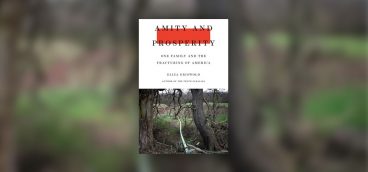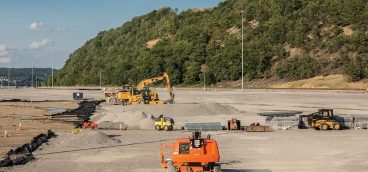Marcellus Shale: A Tricky Situation

For years, it’s been a common rallying cry among activists that the Commonwealth of Pennsylvania has coddled its burgeoning natural gas industry at the expense of other state priorities. Perhaps nothing, they contend, has been more emblematic of that cozy relationship than the fact that Pennsylvania is the only active drilling state in the union that has given the industry a pass on a severance tax, in favor of a less burdensome impact fee.
The debate over a severance tax emerged as a key issue in last year’s gubernatorial election. All four Democratic primary candidates—buoyed by polls that indicated widespread public support for the tax—endorsed it, with proposals ranging from an 11 percent tax all the way down to four percent.
None was more emphatic than businessman Tom Wolf, who, along with a host of other issues, rode his plan for a five percent tax all the way to an historic victory over the tax phobic former Governor Tom Corbett.
So, is it now likely, with public opinion at his back, and a $2 billion fiscal sinkhole right in front of him, that the new governor will be able to marshal the support he would need from a reluctant legislature and resist the expected pushback from the industry to pass a severance tax?
The answer, say analysts and academics who study the issue, is maybe.
It would be tempting to see a mandate in Wolf’s lopsided 55 to 45 percent victory that for the first time in recent history ousted a sitting governor—a mandate to drive through at least some parts of his agenda, say political analysts, not least Wolf’s proposed severance tax on the natural gas drilling industry.
And there is little question that a number of key factors auger well for it. The state is, after all, facing a staggering $1.9 billion structural deficit, with expenditures exceeding revenues by about two to one, a hole that former Governor Tom Corbett plugged last year with a series of one-time budget fixes. And Wolf does appear to have tapped into the public’s demand to reverse Corbett’s reductions on spending for education, the analysts say.
There also is widespread support among the public—even in some of the state’s most active drilling areas and among some of its most conservative voters—for some kind of severance tax that would augment or replace the roughly $200 million generated by the state’s impact fee. As Chris Borick, a political science professor and director of the Muhlenberg College Institute of Public Opinion, put it, “The public… has consistently shown in public opinion polls a support for an extraction tax.
“We’ve broken out some of our analysis by region… places where there are deposits versus where there aren’t and you still see pretty solid support,” he added. In other words, while support for such a tax is predictably strong in places like the suburbs outside of Philadelphia, it’s also surprisingly strong in more rural climes, where the industry is most active.
And yet, the same electorate that convincingly swept Wolf into office last November effectively issued a split decision, also sending to Harrisburg a state legislature that is markedly more conservative than the last one, says G. Terry Madonna, director of the Center for Politics and Public Affairs at Franklin & Marshall College. “You’ve got eight new House members, and if you look at them, probably four or five are more conservative than the people they replaced. You’ve got three new senators; two replaced Democrats and are more conservative.” And the new leadership in the House—Speaker Mike Turzai, whose district includes Warrendale, Wexford and McCandless, and Majority Leader Dave Reed, who represents Indiana County—have both come out firmly against Wolf’s call during the campaign for a five percent severance tax that he optimistically estimated would bring in $1 billion in revenue.
And not only is the House leadership opposed to it, perhaps predictably, so is the industry.
Despite persistent reports that some leaders in the industry might be willing—and may even have quietly drafted plans—to deal with the idea that the only drilling state in the nation without a severance tax will sooner or later end up with one, the industry’s official position remains steadfast opposition.
The industry’s leaders warn that such a tax could drive rigs out of state to places such as West Virginia or Ohio, states that while they have severance taxes on the books are deemed to be friendlier to industry than Pennsylvania might become. And they contend that if that were to happen, it would threaten other economic development in Pennsylvania that they argue is driven by the Marcellus boom. As Dave Spigelmyer, president of the Marcellus Shale Coalition, the industry’s trade group, put it: “This governor enters office with… an ace in his hand. He enters office with natural gas prices half of what they were in 2008 to residential consumers and industrial end users. Gasoline prices are a dollar less or close to dollar less than they were a year ago. If we get this… generational opportunity right, we have the opportunity to grow manufacturing jobs in steel and glass and plastics and chemicals and fertilizers and… pharmaceuticals.
“I would tell you that we may be shooting very low at a severance tax, when we ought to be shooting at the jobs that can be generated in those areas, and actually the tax revenue through those jobs if we’re successful in using that affordable energy to grow those manufacturing jobs.”
And there’s also the fact that persistently low natural gas prices, particularly for gas from the northeastern part of the Marcellus, make it unlikely that a severance tax—even if it were the full 5 percent Wolf campaigned for—would generate anywhere near the $1 billion in revenue that the governor expected, Spigelmyer said.
“It doesn’t get him anywhere near that,” Spigelmyer said. “I mean there’s a lot of locations in Appalachia where gas is… selling for a buck to a buck and a half. It doesn’t get you there. People are using Henry Hub pricing for gas that few are getting in the Appalachian Basin, if any.”
Despite the industry’s reluctance and the opposition of House leaders, Sharon Ward, director of the liberal-leaning Pennsylvania Budget and Policy Center, contends that there is mounting political pressure to adopt a severance tax, and that the pressure is only likely to increase. “Unless we have some way of closing this budget gap, you will see a new round of giant cuts to schools and they will be Mike Turzai’s cuts, not Tom Corbett’s cuts,” she said. “The public is supportive of a severance tax, and they want to see the cuts to education restored. They were highly unpopular, and they cost Tom Corbett his job.”
To some degree, Diana Stares, director of the Center for Energy Policy and Management at Washington & Jefferson College, agrees that the state’s sagging fiscal fortunes and the public support for a severance tax make its adoption more likely than not. “Just from my own experience in state government, I don’t think we’ve ever seen anything like this; this type of budget shortfall with so few resources to turn to,” said Stares, who spent 31 years as a regional counsel for the Department of Environmental Protection before she resigned in 2012 after a dispute with the Corbett administration. “What that means is that there’s going to be a big push to get that severance tax in some amount.”
But even with that pressure to adopt a tax of some sort, there’s a wild card, she says. Under Act 1—the law that not only established the impact fee but also established a raft of regulations for the drilling industry—local municipalities receive significant cash, and any effort to replace the impact fees with a severance tax would have to take the concerns of those municipalities into account, she says.
“I think they’re going to have to figure out how to balance the impact fee against it. Do you get rid of the impact fee? Do you subsume it in whatever the amount of the severance tax is? I know a lot of the municipalities are worried about losing that income stream, so there’s going to be a lot of dealing, I think.”
Then there’s also the question of what happens to that raft of regulations once lawmakers start tinkering with Act 13.
“I think if we’re revisiting it with an extraction tax… it would probably make sense to revisit the law more comprehensively,” said Borick. “I think from the governor’s perspective, he’d want to make revisions to some elements… the local issues for example, the issues of local regulatory powers in land use and siting and, of course, things like chemical disclosure.”
That is not, however, without risk from the governor’s point of view, Borick said. “Any time you go back and revisit something like this, especially with a more Republican-controlled legislature, you might risk coming out with outcomes that are not optimal for some interests like the more [environmentally active] or Democratic interests of the state.”
But as daunting as all those moving parts may make the process, ironically they may actually make a deal on a severance tax a bit more likely. “There’s going to be a lot of issues at play,” Stares said. “It’s going to be difficult for anybody to project, but I think [Gov. Wolf] has to move forward and try to get a tax. Do I think it will be 5 percent? Nah. I suspect it won’t. I suspect there’ll be a lot of horse trading that’s going to have to go on until they arrive at a number.”
Madonna of Franklin & Marshall agrees, to a point. “All things being even, I thought it had a reasonable chance of getting out of the Senate; much less of a chance of getting out of the House. Do I think it’s dead? No. Do I think it’s a tough sell? Yes. Do I think there’s room… for a compromise percentage? Yes. If I had to bet, I’d say something in the 3 percent range, and no impact fee,” which would put Pennsylvania slightly above the current 2.5 percent rate in neighboring Ohio and below the 5 percent West Virginia charges. But it is still far from a done deal, he said. “We’re into a whole scenario that we’ve not had before. Nobody knows how it will play out.”





